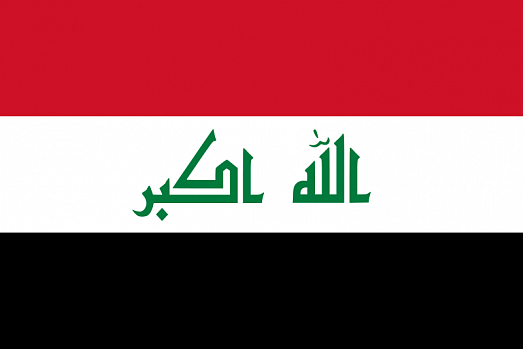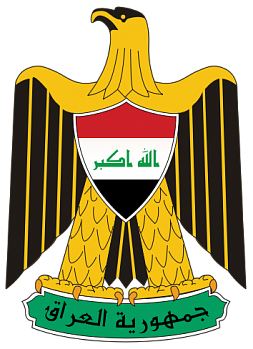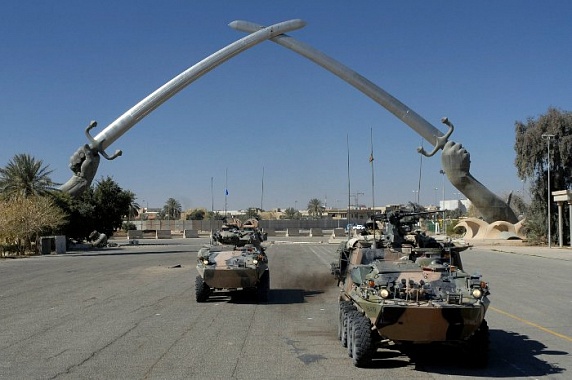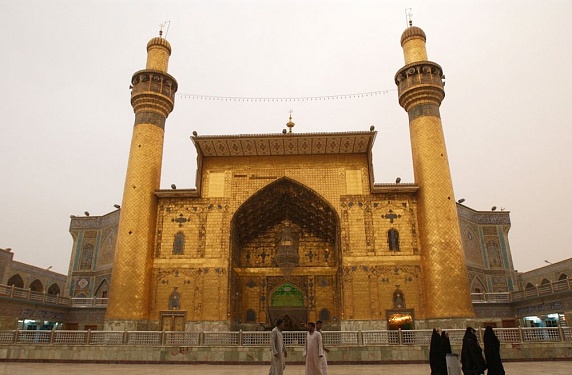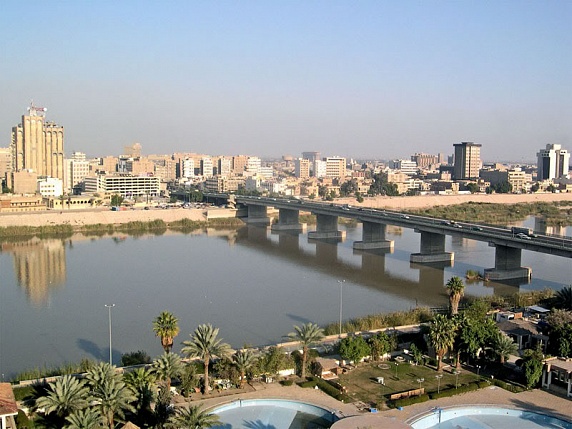 the Republic of Iraq
the Republic of Iraq
Deputy Foreign Minister Sergey Vershinin’s interview with Izvestia, October 9, 2019
Question: Mr Vershinin, following the UN General Assembly session, it was stated that, in the wake of the visa scandal, several UN General Assembly committees could be transferred from New York to another country. Do you think it is possible?
Sergey Vershinin: I think this is feasible, but the decision should be taken by the General Assembly. This is not the first time the United States has violated its obligations under the UN Charter and the agreement on the location of the organisation’s central bodies in the United States. As you may be aware, this is not just a question of this year or today. We have been raising this issue for many years, specifically, since 2004, in the special UN Committee on Relations with the Host Country, because there were similar incidents then, too.
This time, many members of the Russian delegation were denied visas for the 74th session of the UN General Assembly. We were very critical of this decision, condemned it and openly said so primarily during the Foreign Minister’s meetings in New York.
Hence, our proposal to transfer the work of the First Committee and the UN Commission on Disarmament outside the United States in 2020 by decision of the General Assembly. There are proper facilities for this. There are UN offices in Geneva and Vienna. Again, this should be the UN General Assembly’s decision. We believe that such a transfer can be considered and actually made.
People come to the UN to work on important issues and actual problems. They shouldn’t be wondering whether they will make it to the place where they are supposed to work on important matters, including disarmament and strategic stability.
Question: Did our Western colleagues respond to that?
Sergey Vershinin: These matters are reviewed not only by our Western colleagues, but UN members in general. The question has been proposed and is being discussed, and a decision will be made. We are not sure what will happen. But we believe that the time has come to show that the United States has many responsibilities with regard to ensuring access to all who work at the UN General Assembly and other UN-sponsored international events on essential international and regional issues.
Question: Moscow said there would be a symmetric response...
Sergey Vershinin: We often talk about symmetric or asymmetric responses. There must be a reaction and a response anyway. But as far as symmetry is concerned, we are talking about UN visas not being issued. These are special UN visas that are issued so that country representatives can attend official UN events, not for any other goals in the United States and not as part of a bilateral exchange.
Since the UN headquarters is located in the United States, there may not be a 100 percent symmetric response. However, we will now strictly, perhaps even more strictly than before, review visa applications submitted by the United States when it needs to visit Russia.
Question: Is the questioning of Russian MP Inga Yumasheva by the FBI in a New York airport another link in the chain? How will we respond to this incident?
Sergey Vershinin: We have already responded publicly. The Russian representative arrived for an important bilateral event, which has a long history. The Fort Ross Dialogue has been held since 2012. It is a high-profile event and, perhaps, one of the few bilateral events of its kind. It is inappropriate that the Russian representative encountered a problem like this.
We will look closely into every detail of this matter and reach a conclusion. In any case, we believe this kind of incident makes bilateral relations, which are already strained because of the Americans’ actions, even more complicated.
Question: There was a time when Moscow insisted that the UN headquarters should be located in New York, although the initial option was Geneva. Do we regret this decision now after so many years?
Sergey Vershinin: Next year we will celebrate the 75th anniversary of the founding of the UN. There is a trite expression: there are no ifs in history. Whatever happens, happens. The decision made at the time was prompted by important factors. Whatever viewpoint you may embrace, the UN, despite all its imperfections and foibles, plays the central role in ensuring the steady and stable development of international relations. We want this development to be based on respect for one another’s interests and rights, as well as the principle of the sovereign equality of countries, which are built into the UN Charter.
Of course, things like those mentioned earlier are unlikely to contribute to building confidence in the United States, as far as its commitments are concerned – commitments by the country where the UN headquarters and other UN agencies are located. Anyway, the decision was taken and it has become our common history.
Question: Do you mean the idea that the [UN] headquarters should be moved to a different place is sheer speculation or rumor?
Sergey Vershinin: This is not just rumor – proposals like this are expressed from time to time, including from the public. This type of proposal requires careful examination as we are talking about a mechanism that has evolved over several decades. If the UN member countries decide to do this, everything can be done, however, these aspirations and decisions must be carefully thought out.
Question: During the General Assembly, the Americans introduced new sanctions against Russia due to the situation in Syria. How does the crisis in Russian-American relations affect our cooperation within the UN?
Sergey Vershinin: Unfortunately, we are used to the sanctions, which are unjust and unilateral. We believe that they only aggravate our bilateral relations and some regional problems. The sanctions you have mentioned were introduced near the beginning of the 74th session of the General Assembly. In addition to a completely negative reaction, they evoke regret. I mean the measures in connection to the fact that the Russian Aerospace Forces in Syria are supplied with aviation fuel. Introducing sanctions under such a pretext is completely unacceptable. It is well-known that Russia has been helping Syria’s lawful government fight terrorism since 2015, including by military means. This means the sanctions are designed to make it more difficult to provide this help. It is questionable then if a country that introduces such sanctions is really committed to the fight against terrorism. Everything that we do is aimed at supporting the rightful government’s fight against terrorism.
Question: You are saying that such steps make no sense, because they do not hurt Russia and Russia is able to counter them. Then why is this done?
Sergey Vershinin: I believe those who introduce these sanctions understand this as well as we do. I can confirm what you’ve said, that sanctions do not lead to anything good but also cannot stop Russia and the development of Russia’s economy and foreign economic ties. Moreover, they cannot affect Russia’s policy on the global stage and in regional affairs. It is clear that the countries that have introduced unilateral sanctions never achieved their original goals.
Sanctions are not only introduced against Russia. Their goal is to make a country, Russia for example, change its course on the global stage or change its approach to acute regional problems. This is not happening and won’t happen; so the anticipated result will not be achieved.
Question: Who should be included in the Security Council in order to overcome the underrepresentation of developing countries that Sergey Lavrov mentioned?
Sergey Vershinin: We have talked about the importance of supporting efforts to reform the UN Security Council several times. Intergovernmental talks on this subject have been conducted for a long time in New York. As the central authority, the Security Council is responsible for maintaining peace, stability and security.
Given the changes that have occurred worldwide and the experience that we all have gained over recent decades, it is imperative to expand the Security Council, primarily by way of including countries of Asia, Africa and Latin America, as they are underrepresented. It is too early and even unnecessary to talk about how it will happen and what countries would make it to the Security Council.
It is important to ensure that everyone trusts and respects the Security Council. This means that any decision to reform the Security Council should be supported - better by everyone or at least by the overwhelming majority - but not by two-thirds of the UN members. If one third are against it, everyone will question the legitimacy and prestige of an expanded UN Security Council. This needs to be avoided. The path of reform must be followed thoughtfully.
Question: The Russian delegation held talks with Egypt on the sidelines of the General Assembly. Did you discuss resuming flights to Sharm El Sheikh and Hurghada?
Sergey Vershinin: Many aspects of bilateral relations were touched on, including air travel to two of Russia’s favourite holiday destinations, Sharm El Sheikh and Hurghada. This matter is being carefully considered by experts in order to fully guarantee reliable operation of these airports for passenger safety. For us, Russian citizens’ safety is a priority. We have reason to believe that the experts will complete their efforts and reach a common conclusion that will make it possible to resume flights along these routes soon.
Question: Could we say before the end of the year?
Sergey Vershinin: I cannot provide specific dates because it is not a deadline that matters. What matters is ensuring Russian citizens’ safety in cooperation with Egypt, as a traditionally friendly country.
Question: Syria and the recently announced Constitutional Committee is another important issue at the General Assembly. Am I correct in saying that the first meeting will take place on October 31?
Sergey Vershinin: This is a major event. Let me say that finalising the list of committee members was something we announced at the summit with Russia, Iran and Turkey in the Astana format in Ankara on September 16. It is the Three Astana guarantors that made the decisive contribution to what was done and announced in New York. On September 23, the UN Secretary-General announced that the formation of the Constitutional Committee was completed.
You are correct that the tentative date for the first meeting in Geneva is late October. I would think it will take place on October 29.
What’s more important is the completion of the major stage that began after the Congress of Syrian National Dialogue was held in Sochi in January 2018. Now we are entering a new stage – the preparations for and the holding of the meeting in Geneva.
Question: When the committee convenes, what should be the next step towards a political settlement in Syria?
Sergey Vershinin: The committee is facing a very serious task because for the first time in many years of bloody drama in Syria, its people, which represent the government, the opposition and civil society – this is the principle on which the committee is based – will sit together and begin discussing Constitutional reform that will reflect their own vision of Syria’s future.
After this, it will be possible to move to new stages, while keeping in mind Security Council resolutions, primarily, Resolution 2254. First, it is necessary to launch the Constitutional Committee and reach a consensus on what the future of Syria will have. Decisions will be adopted by at least a two thirds vote under this procedure. A foundation for holding elections may be laid in this way.
Question: How much time do you think it will take a country that has had to overcome this crisis and war to create a new constitution?
Sergey Vershinin: I would not care to engage in guesswork or suggest any artificial dates. I am confident that the Syrians are strong and talented enough to move quickly along the road of mutually acceptable agreements on the major issues of their future.
Question: Are there any grounds to expect the West to change its position on Bashar al-Assad after the Syrian Constitutional Committee is established? Some analysts say that he may take part the political process…
Sergey Vershinin: I would like to hope that our Western partners will change their approach not even to one person, even if he is the president, but to the Syrian people. Assad is the legally elected president of the Syrian Arab Republic. Nobody from outside should decide for any country how a people should live or what leader to vote for in a free and honest democratic election.
In any event, the creation of the Constitutional Committee and a clear outline for a political settlement should encourage many politicians, including those in the West, not to interfere with this process. Instead of putting grit in the bearings, which, regrettably, has happened in the past, it is necessary to be attentive and respectful to the decisions that will be made by Syrians themselves, including the election of their leaders.
Question: Will Russia help Syria to hold the elections?
Sergey Vershinin: We are helping Syrians in the fight against terrorists and in the socioeconomic development. If they ask us, we will certainly be able to help them to organise and hold the elections, which must be held by Syrians themselves with UN assistance.
Question: Can you say that the problem with the Rukban camp, which is being closed down, has been settled for good?
Sergey Vershinin: No, unfortunately, not. I would like to say that Syria, working together with Russian representatives, has taken huge efforts to settle the problem of Rukban. The situation is different from the Al-Hawl camp with over 70,000 refugees, which has become a breeding ground for terrorism.
We see a positive trend regarding Rukban. Over 18,000 people have left it, most of them headed for the regions controlled by Damascus. But there are still people remaining there, so the Rukban problem has not been settled yet.
We have said publicly more than once that the root cause of the problem is that Rukban is located on the territory that has been illegally occupied by the United States. This is an obvious and well-known fact. I am referring to the so-called Al-Tanf zone. This is why UN cargo and representatives, supported by the Syrian Arab Red Crescent (SARC), have problems with reaching the camp. Their operations must be coordinated with the US troops that are deployed in the zone illegally and are supporting, also illegally, the local armed groups.
Question: Is there any agreement on closing down Rukban and evacuating refugees from it?
Sergey Vershinin: Framework agreements regarding this have been reached. Unfortunately, they have not been implemented, including through the fault of the US side. However, I would like to repeat that the goal is not only to close down the camp, but also to ensure that the Americans withdraw from the sovereign territory of Syria, which will help to settle all or at least many problems.
Question: Does Russia support the Kurds’ drive for autonomy within Syria? Can the Syrian and Iraqi Kurds come together to form a united Kurdistan?
Sergey Vershinin: Apart from Syria and Iraq, Kurds also live in other Middle Eastern and other countries, including Iran and Turkey. Historically, Russia has always had very good and friendly relations with Kurds. We see Syrian Kurds as an integral part of the Syrian nation. Our position of principle is that Kurds should find common language with Damascus.
This can only be done through dialogue. We are urging and supporting this dialogue. The process is ongoing, but it is hampered by difficulties. You mentioned the drive for autonomy. This is not for us but for Syrians, namely Kurds and Damascus, to decide through dialogue within the framework of united Syria. This solution is possible.
Question: Sergey Lavrov was on an official visit to Baghdad and then went to Erbil. It is a historic visit, the first official trip by a Russian foreign minister to Erbil while in office.
Sergey Vershinin: This was the first visit of its kind and it is a very important visit. We have very advanced and close relations with Baghdad and with all Iraqis. I believe this trip is particularly important today as an indication of our confidence in the Iraqis’ ability to resolve the remaining controversial issues through dialogue and as broad a discussion as possible.
Question: The situation in Iraq has seriously deteriorated. What is your view of how things will develop?
Sergey Vershinin: We believe in the Iraqi people’s ability to solve these problems. Iraq has always been one of the richest countries in the region, in terms of mineral resources. The country is slowly but progressively going down the path of restoring national unity and dialogue. This is very important, given the sufferings that the Iraqi people have experienced since the US aggression there years ago.
The effort to find a balance as well as regard for common interests required that the Iraqi political elite, including the Sunnis, the Shias and the Kurds, take a more responsible stance. They have managed to do this. We realise that today this can be done as well.
Question: Moscow also held talks with Georgian representatives. Was the resumption of flights on the agenda during the talks? It would be logical to suggest that this was the first question brought up by the Georgian side.
Sergey Vershinin: Indeed, this issue was discussed. I can only cite the statements made by Foreign Minister Sergey Lavrov and Presidential Press Secretary Dmitry Peskov. It is an important issue. It should be addressed with account taken of how things stand after the decision was taken.
Question: But does Russia believe the resumption of flights is likely anytime soon?
Sergey Vershinin: We appreciate our friendly relations with the Georgian people. We will only welcome any step towards improving these relations and bringing them back to normal. However, steps like these will only be taken after considering all the implications.
Question: Another, no less important, meeting at the General Assembly focused on the future of the Joint Comprehensive Plan of Action. Do you believe the attacks on the Saudi oil refineries and the accusations leveled at Iran not only by the Americans but by the French and Germans as well, are related to the Iran nuclear deal? Could this impact the future of this deal?
Sergey Vershinin: Of course, the attacks on the Saudi oil refineries have further destabilised the situation in a region that already has too many conflicts as it is and where tensions are running high. It is important that everyone looks carefully into the circumstances and shows restraint. I do not believe these attacks are directly linked to the Iran nuclear deal.
The JCPOA is a good example of how solutions can be found to the most complicated issues. We are not talking about replacing the deal – rather, about implementing it.
Not only have the Americans pulled out of the JCPOA, but they also are trying to have other [parties to the deal] abandon their commitments. We believe this is not right, since the agreements do exist and they should be observed. Most importantly, there is nothing to accuse Iran of since it is complying with all of the requirements and the IAEA is carrying out its serious inspections of the country’s nuclear facilities. It is already common to say that today no other country in the world is inspected as thoroughly as Iran to determine the potential to make nuclear weapons.
We appreciate the efforts of our European partners, primarily France. We need the JCPOA, but it must remain the same as initially agreed on. Any other idea can be discussed, but this nuclear deal must be implemented as it is.
Question: Is it clear when the group of five will meet again?
Sergey Vershinin: Work is underway to prepare for the meeting. We maintain regular contacts. Many bilateral meetings also seek to preserve the JCPOA. The same can be said of our meetings in the multilateral and bilateral formats on the sidelines of the UN General Assembly. The Iran nuclear deal was a central issue at many meetings.
Question: Another meeting held on the sidelines of the UN General Assembly was between Sergey Lavrov and Vladimir Zelensky, who promised to comply with all provisions of the Minsk Agreements. The next step after Kiev signed the Steinmeier formula is to hold local elections. Does this mean that Donbass will definitely remain part of Ukraine?
Sergey Vershinin: The coordination of the Steinmeier formula at the October 1 meeting was a crucial move that has opened up opportunities for settling many internal Ukrainian problems. The main thing here is, as it is set out in the Minsk Agreements, that Donbass must have a special status sealed in the Ukrainian Constitution. This is a serious commitment that is yet to be implemented along with the other provisions of the Minsk Agreements. They include amnesty and a special status, under which local residents will be absolutely free to use their native language. A possibility of attaining this goal is being created now.
The meeting between Sergey Lavrov and Vladimir Zelensky in New York was short but productive. It is good that it was followed by positive developments, which we have mentioned just now. It is very important to keep up this positive momentum and that agreements are implemented, primarily by the Ukrainian side. Work in the Normandy format, which is being widely discussed, is very important in this context.
The last time a meeting in this format was held was three years ago. We have been encouraged to meet again, but our position is that first the sides should implement the agreements they have reached. One of them was the Steinmeier formula, amnesty and the voting procedure. Many issues and fundamental details are to be coordinated yet. But there is a possibility in principle of moving forward along this positive path. We must seize this opportunity.
Question: When will the foreign ministers of the Normandy format countries meet?
Sergey Vershinin: This issue is being coordinated.
